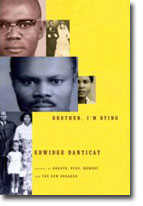Books |
Brother, I’m Dying
Edwidge Danticat
By
Published: Jan 01, 2007
Category:
Memoir
In October of 2004, Rev. Joseph Dantica fled Haiti. The 81-year-old preacher carried a valid U.S. visa. But he was a truthful man — he knew his return to Haiti was unlikely, so when he arrived in Miami, he asked for political asylum.
Instead, Dantica and his 56-year-old son were detained by the Department of Homeland Security. At the Krome Detention Center, authorities confiscated his blood pressure medicine and separated him from his son. Dantica had a seizure. His family was not allowed to see him. He died at Krome.
Homeland Security’s comment: "Mr. Dantica died of pancreatitis while in Homeland Security custody, which an autopsy by the Miami-Dade County medical examiner’s office revealed as a pre-existing and fatal condition."
Makes you want to holler.
Fortunately, Joseph Dantica had a niece who lived in the United States. Edwidge Danticat knew her uncle well — as a child, she had lived with his family for years while her parents were creating a new life in America. And she was a writer, a very good writer indeed. Her book, Breath, Eyes, Memory, was an Oprah selection in 1998. She had won the 1999 American Book Award, she was the darling of the literary crowd.
“To humiliate a good writer,” Norman Mailer once said, “is to give him an axe.”
Well, if ever a writer had an axe….
I opened “Brother, I’m Dying” looking for Danticat to swing that axe at Homeland Security over and over — I wanted that axe to create enough damage for me to put the book down, thinking, “Nothing compensates for a death, but at least those bastards paid something.”
But here is how it starts: “I found I was pregnant the same day that my father’s rapid weight loss and chronic shortness of breath were positively diagnosed as end-stage pulmonary fibrosis.”
Except for the first-person pronoun, that could be the lead for a newspaper article.
And Danticat goes on like that: telling, reporting, not commenting. She writes about her father, Mira, who is a dozen years younger than his brother: his boyhood in Haiti, the charming way he met his wife, his struggles in America, the life he made for his family. She writes about her pregnancy and what it’s like to carry a precious new life while a precious old one is fading out. And she writes about Haiti, and the revolving-door governments.
There are plenty of dramatic stories; Haiti is a country of high drama, extreme violence and powerful religion. Romance, funerals, gang killings, reunions — you blink at the contrasts. And, all the while, Mira Danticat is wasting away. Will the news of his brother’s death kill him? Will he live to see his granddaughter?
All these stories are all told in the same voice. The power of this style is cumulative — by the time Joseph is taken into custody in Miami, you can’t turn the pages fast enough. And still there’s no difference in tone between Joseph donning a wig and a muumuu to escape the death squads in his village and the family deciding not to send his body back to Haiti for burial, lest those same death squads carry out their pledge to behead him, alive or dead.
Mira was a gypsy cab driver, just another refugee in a big Lincoln with industrial strength air fresheners. Joseph was a minister who lost his voice box to cancer. Unremarkable men to most of us, remembered mostly by their families — after being separated for thirty years, they lay, next to one another, in an unremarkable cemetery in Queens.
But Mira had a daughter and Joseph had a niece. And that made all the difference, for in this short, magnificent book, Edwidge Danticat has done something finer than bludgeon some ignorant bureaucrats — she has made us understand her homeland and her family. And, perhaps, she has made her father and uncle immortal.


